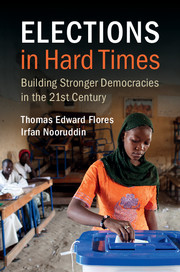Book contents
- Frontmatter
- Dedication
- Epigraph
- Contents
- List of figures
- List of tables
- Preface
- Part I From Elections to Democracy: Theory and Evidence
- Part II Challenges Facing Elections in Developing Countries
- Part III Democracy Promotion for the Twenty-first Century
- 8 Democracy Promotion for the Twenty-first Century
- 9 Conclusions
- Appendix A Data Appendix: Sample, Variables, Sources
- Appendix B Main Statistical Results
- Notes
- Bibliography
- Index
8 - Democracy Promotion for the Twenty-first Century
from Part III - Democracy Promotion for the Twenty-first Century
Published online by Cambridge University Press: 05 September 2016
- Frontmatter
- Dedication
- Epigraph
- Contents
- List of figures
- List of tables
- Preface
- Part I From Elections to Democracy: Theory and Evidence
- Part II Challenges Facing Elections in Developing Countries
- Part III Democracy Promotion for the Twenty-first Century
- 8 Democracy Promotion for the Twenty-first Century
- 9 Conclusions
- Appendix A Data Appendix: Sample, Variables, Sources
- Appendix B Main Statistical Results
- Notes
- Bibliography
- Index
Summary
National elections are a signal event in all countries and deservedly so. They represent the assertion of popular sovereignty over political elites in a manner unimaginable to our near ancestors. Even in countries with longer experiences with popular elections, it is only in the most recent decades that principles of universal suffrage have been protected and enforced. Today's elections are the sole source of legitimacy for rulers around the world. A mere handful of states are yet to hold elections for national office, but resist only at the cost of international isolation and domestic protest. The rise of elections as a means not only for choosing political leaders, but also for building democracy, has been one of the major political changes of the last fifty years (and, by extension, of recent human history). Yet facts are stubborn things – even as cleaner, more transparent elections have spread to all corners of the globe, their capacity for promoting democracy has diminished. Rather, as we have shown throughout this book, elections in the developing world have all too often either hurt the cause of democracy or, at best, contributed little to its advancement. This is especially true precisely where we most dearly wish elections to succeed: in societies with long histories of authoritarianism and little state capacity.
Commentators from The Economist to Larry Diamond increasingly worry about a democratic backlash worldwide. The disappointments of the Arab Spring tempered electoral enthusiasm, if any still existed after watching the unraveling of Iraq and Afghanistan. The events unfolding in Hungary – where Prime Minister Viktor Orbán has publicly denounced liberal norms in favor of an illiberal state while winning his third consecutive election in 2014 – bode ill for the health of liberal democracy in that member of the European Union and NATO, both of which are considered democratic bastions.
Our pessimistic findings notwithstanding, we come not to bury elections but rather to praise them. For all their limitations, there are no politically feasible alternatives to elections as a peaceful means for choosing legitimate leadership. The proverbial genie has escaped the bottle and alternatives to mass suffrage – whether apartheid-like restrictions on suffrage, military dictatorship, or rule by clerical fiat – are normatively beyond the pale.
- Type
- Chapter
- Information
- Elections in Hard TimesBuilding Stronger Democracies in the 21st Century, pp. 173 - 193Publisher: Cambridge University PressPrint publication year: 2016
- 1
- Cited by



